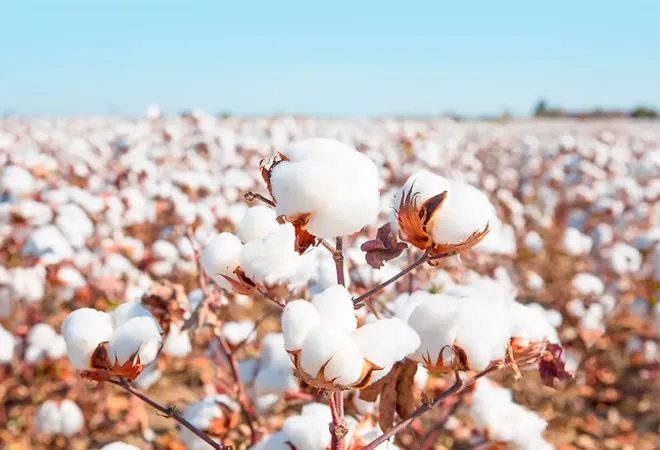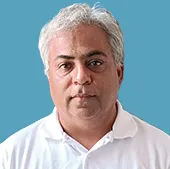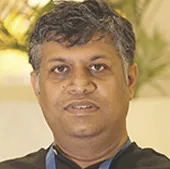
With a vast agro-ecological diversity, India is home to a range of crops including grains, pulses, oilseeds, vegetables, sugarcane, soybeans, amongst others, which help in providing food and nutrition security and economic sustainability to its people. Cotton, one of the foremost amongst these crops, has a strategic role in India’s international agriculture play. India is
the world’s third-largest exporter of cotton and the second-largest exporter of textiles, therefore, also contributing significantly to the country’s economy.
No less than
6 million small-to-medium-sized Indian cotton farmers and farm workers, participate in the global cotton value chain. The country, therefore, has a responsibility to ensure that not only does it continue to strengthen its position in the global cotton trade but also plans for a strong, secure, and sustainable future. One of the ways to do so is to adapt to new emerging global market-based initiatives that promote sustainable development. It will not only help India to remain globally competitive in the cotton supply chain but also give it an edge by using the scope of development diplomacy to strengthen its position in the international cotton and textile trade.
It is pursuing environmental and social upgradation to meet the sustainability requirements imposed by global textile and home furnishing retailers, so as to mitigate the adverse impacts of climate change on cotton farmers and cotton cultivation.
The emergence of voluntary sustainable standards in cotton
The global textile supply chain is undergoing a paradigm shift; it is pursuing environmental and social upgradation to meet the sustainability requirements imposed by global textile and home furnishing retailers, so as to mitigate the adverse impacts of climate change on cotton farmers and cotton cultivation.
This is being accomplished by using Voluntary Sustainability Standards (VSS), which encapsulate certification schemes, labelling programmes, and private standards. The major VSS that are dominant in the sustainable cotton value chain today include Better Cotton Initiative (BCI), Organic Cotton, Fairtrade Cotton, and Cotton Made in Africa.
Dual benefits for India
Adapting to VSS is clearly beneficial for India. On the one hand, it will help it remain globally competitive in the cotton supply chain and strengthen its position in the export market, while on the other, it will help meet India’s SDG commitments.
India has made considerable progress in its transition towards a more sustainable cotton farming ecosystem. The total cotton area
under VSS has reached 1.5 million hectares, contributing to 24 percent of the global VSS cotton area. With approximately 0.2 million hectares of area for production, it is the largest producer of organic cotton, accounting for 50 percent of global organic cotton production, and the second-largest producer of ‘
Better Cotton’, accounting for 16.5 percent of total Better Cotton production covering an area of
1.5 million hectares.
India has made considerable progress in its transition towards a more sustainable cotton farming ecosystem.
According
to the BCI's 2020 Impact Report for India, Better Cotton farmers have 9 percent higher yields and 18 percent higher profit than conventional farmers.
The Thinkstep report 2018 on the Life Cycle Assessment of VSS Cotton conducted in Madhya Pradesh revealed a reduction of 50 percent in climate change impact, 59 percent in blue water consumption, 84 percent in ecotoxicity, and 100 percent eutrophication in organic over conventional cotton. Clearly, The VSS cotton growth story in India has already demonstrated its contribution towards the achievement of SDG targets for Zero Hunger (Goal 2), Clean Water and Sanitation (Goal 6), Responsible Consumption and Production (Goal 12), Life on Land (Goal 15), and Climate Action (Goal 16). VSS cotton delivers real, measurable outcomes according to priority indicators as outlined by NITI Aayog which maps India's SDG goals. These indicators include changes in the extent of water bodies, improving groundwater withdrawal against availability, and rationalising nitrogen fertiliser.
Conclusion
There are multiple reasons for India to keep pace with the changes and developments sweeping the cotton sectors across the world. It will enable India to protect, strengthen, and further bolster its standing in the global development map. India must scale up the VSS while aligning it with its SDG commitments since VSS in cotton ensures a better production system, sourcing methods, and consumption patterns while also influencing the lives of hundreds of millions. India as an emerging economy seeking to move toward a more sustainable future will do well to understand the clear linkages between VSS and the attainment of the SDGs while reaping other immediate economic benefits. A single focus on the sustainability ecosystem will not help it meet all of the requirements. To effectively use VSS as a means of accelerating progress toward SDG targets, businesses, investors, and governments must work together.
India must scale up the VSS while aligning it with its SDG commitments since VSS in cotton ensures a better production system, sourcing methods, and consumption patterns while also influencing the lives of hundreds of millions.
The government has greater responsibility. They need to foster an environment conducive to sustainable cotton production and processing, including financial assistance to supply-chain actors committed to VSS. There is a need to review existing agriculture policies and schemes to encourage sustainable production. Diffusion of new and innovative financial products such as blended finance and impact investments are required to address environmental and social risks associated with cotton production. If all these measures are embraced and enforced, India can strike gold with its cotton.
The views expressed above belong to the author(s). ORF research and analyses now available on Telegram! Click here to access our curated content — blogs, longforms and interviews.



 With a vast agro-ecological diversity, India is home to a range of crops including grains, pulses, oilseeds, vegetables, sugarcane, soybeans, amongst others, which help in providing food and nutrition security and economic sustainability to its people. Cotton, one of the foremost amongst these crops, has a strategic role in India’s international agriculture play. India is
With a vast agro-ecological diversity, India is home to a range of crops including grains, pulses, oilseeds, vegetables, sugarcane, soybeans, amongst others, which help in providing food and nutrition security and economic sustainability to its people. Cotton, one of the foremost amongst these crops, has a strategic role in India’s international agriculture play. India is  PREV
PREV



